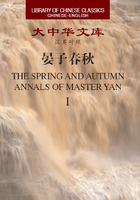
3.8 [58] 景公问莒鲁孰先亡晏子对以鲁后莒先
齐景公问莒国和鲁国谁先灭亡,晏子回答说鲁国后亡莒国先亡
【原文】
景公问晏子:“莒与鲁孰先亡?”对曰:“以臣观之也,莒之细人,变而不化,贪而好假,高勇而贱仁,士武以疾,忿急以速竭,是以上不能(飬)〔养〕其下,下不能事其上,上下不能相〔收〕,则政之大体失矣。故以臣(之观)〔观之〕也,莒其先亡。”公曰:“鲁何如?”对曰:“鲁之君臣,犹好为义,下之妥妥也,奄然寡闻,是以上能(其养)〔养其〕下,下能事其上,上下相〔收〕,政之大体存矣。故鲁犹可长守,然其亦有一焉。彼邹滕雉奔而出其地,犹称公侯,(大)〔小〕之事(小)〔大〕,弱之事强,久矣,彼周者,殷之树国也,鲁近齐而亲殷,以变小国,而不服于邻,以远望鲁,灭国之道也。齐其有鲁与莒乎?”公曰:“鲁与莒之事,寡人既得〔而〕闻之矣,寡人之德亦薄,然后世孰践有齐国者?”对曰:“田无宇之后为几。”公曰:“何故也?”对曰:“公量小,私量大,以施于民,其与士交也,用财无筐箧之藏,国人负携其子而归之,若水之流下也。夫先与人利,而后辞其难,不亦寡乎?若苟勿辞也,从而抚之,不亦几乎?”
【今译】
3.8 [58] DUKE JING ASKED: WH ICH W ILL PERISH FIRST,JU OR LU? YANZI REPLIED THAT LU WOULD PERISH LATER AND JU FIRST.
Duke Jing queried Yanzi as follows: “Which w ill be the first to perish,Lu or Ju?”[1]
Yanzi replied: “As I see it,the common people of Ju change,but they are not transformed for the better. They are greedy and fond of falsehood. They value courage highly and hold humaneness in contempt. Their officers are fast,quick-tempered,and quickly exhausted. Therefore,the superiors cannot nurture their inferiors,while the inferiors cannot serve their superiors. When superiors and inferiors cannot get on close terms with each other,then the fundamental structure of the government is lost. Therefore,as I see it,Ju w ill probably be the first to perish.”
The Duke said: “What about Lu?”
Yanzi said: “The ruler and ministers of Lu seem to be fond of acting righteously; their inferiors are docile,weak,and seldom heard from. Therefore,the superiors can nurture their inferiors,while the inferiors can serve their superiors. When superiors and inferiors get on close terms with each other,the fundamental structure of the government survives. Hence,it looks as if Lu may be preserved for a long time—though there is one reason why they m ight fail[2] after all. The territories of Zou and Teng[3] are so small that pheasants who merely flutter about are already beyond the borders,and still their rulers are called ‘dukes’ and ‘lords.’ It has been the rule for long that the small serves the big and the weak serves the strong; even the Zhou Kingdom was previously a state enfeoffed by Yin.[4] Lu is located near Qi but feels kinship to Yin,[5] and thereby contravenes the rule of conduct for small states,and is no longer subjected to its strong neighbor. From a distant vantage-point,this is how Lu w ill be destroyed. Qi w ill take possession of both Lu and Ju.”
The Duke said: “I have already heard of the situation in Lu and Ju. My virtue,too,is slight,so who in later generations w ill ascend the throne and take possession of the State of Qi?”
Yanzi replied: “Probably the descendants of Tian Wuyu.”[6]
The Duke said: “Why?”
Yanzi replied: “The standard,public measures are small,but their own private measures are large,and they distribute to the people accordingly.[7] In dealing w ith officers,they make use of property w ithout depositing it in boxes and trunks. The people of the state turn to them,as water flows downhill,carrying their children on their backs and arms. Isn’t it unlikely for people to first benefit from others and then turn away from them in time of difficulty? And if,indeed,they do not ignore their beneficiaries’difficulties,and their beneficiaries continue to pacify them,are they not coming close to gaining possession of Qi?”
注释
[1]Ju 莒 was a small state located in the present day Ju County,which was destroyed by the state of Chu 楚 in 431.
[2]亦→失 (JS,194/8 ).
[3]Zou 邹—identical with Zhu 邾—and Teng 滕 were two tiny princedoms located in Lu and Song,respectively.
[4]The Yin (Shang) dynasty enfeoffed the Zhou as a city-state,which developed as a kingdom situated to the west of the Yin and subservient to them. Later,the Zhou overthrew the Yin and enfeoffed their descendants in the state of Song 宋.
[5]I.e.,they feel kinship to the small and w eak state of Song 宋. The JS,194/11,suggests to replace Yin 殷 with Jin 晋 since during the period under consideration,the ruler of Lu paid many tribute visits to the state of Jin.
[6]Tian Wuyu or Chen Huanzi 陈桓子,the fifth head of the Chen lineage in Qi. For a sim ilar discussion between Duke Jing and Yanzi concerning the future of Qi and the Tian (Chen) fam ily,see,Hanfeizi,34/98/22.
[7]Item 4.17 [97],and the Zuozhuan,B10. 3/323/23-26,say that the private measures of the Chen (Tian) clan such as dou 豆,qu 区,fu 釜 and zhong 钟 are a quarter bigger than the standard public measures. Both texts continue to explain that the members of the clan lend to the people according to their own private measures and take back according to the standard,public measures; hence their popularity.